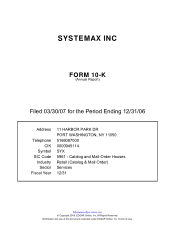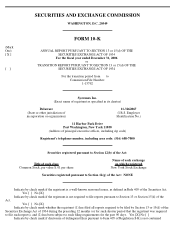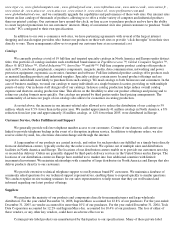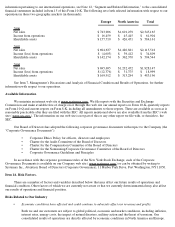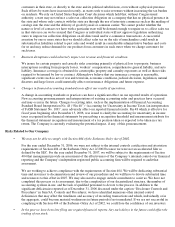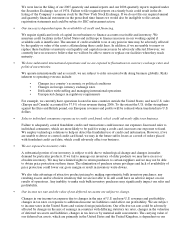Circuit City 2006 Annual Report Download - page 10
Download and view the complete annual report
Please find page 10 of the 2006 Circuit City annual report below. You can navigate through the pages in the report by either clicking on the pages listed below, or by using the keyword search tool below to find specific information within the annual report.
Risks Related to Our Company
customers in their state, or directly to the state and its political subdivisions, even without a physical presence.
Such efforts by states have increased recently, as states seek to raise revenues without increasing the tax burden
on residents. We rely on United States Supreme Court decisions which hold that, without Congressional
authority, a state may not enforce a sales tax collection obligation on a company that has no physical presence in
the state and whose only contacts with the state are through the use of interstate commerce such as the mailing of
catalogs into the state and the delivery of goods by mail or common carrier. We cannot predict whether the
nature or level of contacts we have with a particular state will be deemed enough to require us to collect sales tax
in that state nor can we be assured that Congress or individual states will not approve legislation authorizing
states to impose tax collection obligations on all direct mail and/or e-commerce transactions. A successful
assertion by one or more states that we should collect sales tax on the sale of merchandise could result in
substantial tax liabilities related to past sales and would result in considerable administrative burdens and costs
for us and may reduce demand for our products from customers in such states when we charge customers for
such taxes.
•
Business disruptions could adversely impact our revenue and financial condition.
We insure for certain property and casualty risks consisting primarily of physical loss to property, business
interruptions resulting from property losses, workers’ compensation, comprehensive general liability, and auto
liability. Insurance coverage is obtained for catastrophic property and casualty exposures as well as those risks
required to be insured by law or contract. Although we believe that our insurance coverage is reasonable,
significant events such as acts of war and terrorism, economic conditions, judicial decisions, legislation, natural
disasters and large losses could materially affect our insurance obligations and future expense.
•
Changes in financial accounting standards may affect our results of operations.
A change in accounting standards or practices can have a significant effect on our reported results of operations.
New accounting pronouncements and interpretations of existing accounting rules and practices have occurred
and may occur in the future. Changes to existing rules, such as the implementation of Financial Accounting
Standard Board Interpretation No. 48 (“Fin 48”) “Accounting for Uncertainty in Income Taxes (an interpretation
of FASB Statement No. 109)", may adversely affect our reported financial results. Fin 48 which is effective for
fiscal years beginning after December 15, 2006, was issued to clarify the accounting for uncertainty in income
taxes recognized in the financial statements by prescribing a recognition threshold and measurement attribute for
the financial statement recognition and measurement of a tax position taken or expected to be taken in a tax
return. The Company is currently evaluating the potential impact, if any, of this pronouncement.
•
We may not be able to comply with Section 404 of the Sarbanes
-
Oxley Act of 2002.
For the year ended December 31, 2006, we were not subject to the internal controls certification and attestation
requirements of Section 404 of the Sarbanes-Oxley Act of 2002 because we were not an accelerated filer as
defined by the SEC. For the year ended December 31, 2007, we will be subject to the requirements of Section
404 that management provide an assessment of the effectiveness of the Company’
s internal control over financial
reporting and the Company’s independent registered public accounting firm will be required to audit that
assessment.
We are working to achieve compliance with the requirements of Section 404. We will be dedicating substantial
time and resources to documentation and review of our procedures and we will have to devote substantial time
and resources to this effort in 2007. We may also need to engage outside consultants to assist us. We have not
completed this process or its assessment, due to the complexities of our decentralized structure, the number of
accounting systems in use, and the lack of qualified personnel to devote to the process. In addition to the
significant deficiencies reported as of December 31, 2006 discussed under the caption “Disclosure Controls and
Procedures” in Item 9A. Controls and Procedures; we have identified numerous other internal control
deficiencies that may affect the timeliness and accuracy of recording transactions and which, individually or in
the aggregate, could become material weaknesses in future periods if not remediated. If we are not successful in
complying with Section 404 of the Sarbanes
-
Oxley Act of 2002, we could lose the confidence of our investors.
•
In the past we have been late filing our required financial reports. Any such delays in the future could affect the
trading of our stock.

